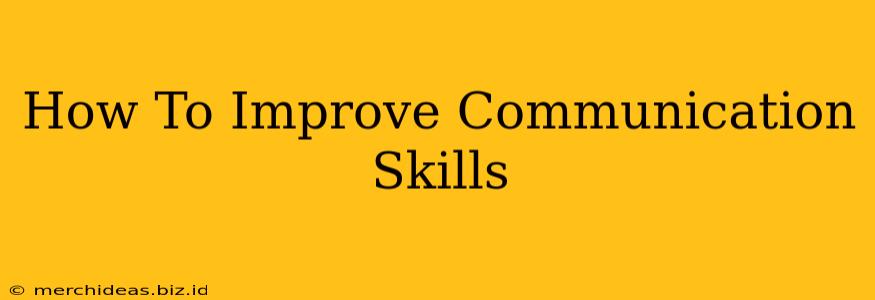Effective communication is the cornerstone of success in both personal and professional life. Whether you're aiming to nail that big presentation, strengthen your relationships, or simply express yourself more clearly, honing your communication skills is an invaluable investment. This comprehensive guide will equip you with practical strategies and actionable tips to significantly enhance your communication abilities.
Understanding the Fundamentals of Communication
Before diving into improvement techniques, let's establish a solid understanding of what constitutes effective communication. It's not just about speaking; it's about conveying your message clearly and ensuring it's understood by your audience. This involves several key components:
- Clarity: Using precise language and avoiding jargon ensures your message is easily understood.
- Conciseness: Getting straight to the point respects your audience's time and keeps them engaged.
- Active Listening: Truly hearing and understanding what others say is crucial for effective two-way communication.
- Empathy: Putting yourself in the other person's shoes fosters understanding and strengthens connections.
- Nonverbal Communication: Body language, tone of voice, and facial expressions play a significant role in conveying your message.
Practical Strategies to Enhance Your Communication Skills
Now let's delve into specific strategies you can implement to boost your communication prowess:
1. Active Listening: The Cornerstone of Effective Communication
Active listening goes beyond simply hearing; it involves fully concentrating on the speaker, understanding their message, responding thoughtfully, and remembering what was said. To become a better active listener:
- Pay attention: Minimize distractions and focus entirely on the speaker.
- Show you're listening: Use nonverbal cues like nodding and maintaining eye contact.
- Ask clarifying questions: Ensure you understand the speaker's message completely.
- Summarize and paraphrase: Restate the speaker's points to confirm your understanding.
- Withhold judgment: Listen objectively without interrupting or formulating your response prematurely.
2. Mastering Nonverbal Communication
Nonverbal cues often speak louder than words. Pay close attention to your body language:
- Maintain eye contact: This shows engagement and confidence. (But avoid staring intensely!)
- Use open body language: Uncrossed arms and a relaxed posture convey openness and approachability.
- Match your tone to your message: Your voice should align with the message you're trying to convey.
- Be mindful of your facial expressions: Your face communicates emotions clearly.
3. Enhancing Your Verbal Communication Skills
Improving your spoken communication involves several key aspects:
- Choose your words carefully: Use precise language that is appropriate for your audience.
- Structure your thoughts: Organize your ideas logically before speaking.
- Practice speaking clearly and concisely: Avoid rambling or using filler words like "um" and "uh."
- Vary your tone and pace: Monotony can be boring; modulation keeps your audience engaged.
- Practice, practice, practice: The more you speak, the more confident and fluent you'll become. Consider joining a Toastmasters club or practicing public speaking opportunities.
4. Improving Written Communication
Strong written communication is essential in today's digital age.
- Proofread carefully: Errors undermine credibility. Utilize grammar and spell-check tools.
- Use clear and concise language: Avoid jargon and overly complex sentences.
- Structure your writing logically: Use headings, subheadings, and bullet points to improve readability.
- Know your audience: Tailor your writing style to suit your intended reader.
Overcoming Communication Barriers
Several factors can hinder effective communication. Understanding and addressing these barriers is crucial:
- Language barriers: Use clear and simple language, and consider translation services if necessary.
- Cultural differences: Be mindful of cultural nuances in communication styles.
- Emotional barriers: Manage your emotions and approach conversations with empathy.
- Physical barriers: Ensure you have a clear line of sight and minimize distractions.
Continuously Improve Your Communication Skills
Improving your communication is an ongoing process. Regularly seek feedback, practice actively, and stay open to learning new techniques. Embrace opportunities to hone your skills – the rewards are immeasurable, both personally and professionally. By consistently applying these strategies, you'll not only enhance your communication but also build stronger relationships and achieve greater success in all aspects of your life.
